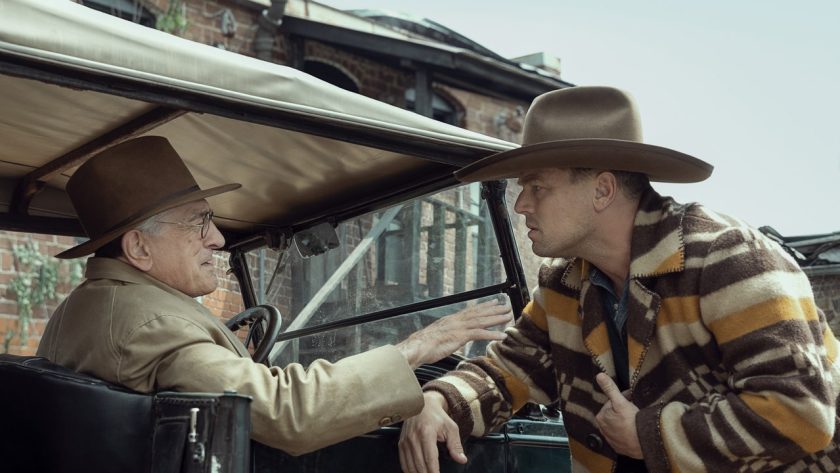Before his solemn turn in The Revenant, DiCaprio had been on a run of playing doomed titans. In 2013, he starred in both The Great Gatsby and The Wolf of Wall Street, respectively playing literary icon Jay Gatsby and disgraced stockbroker Jordan Belfort. Gatsby and Belfort are, if nothing else, smooth operators, and DiCaprio tackles them with a twinkle in his eye. While Gatsby is mysterious and Belfort is a little stinker, DiCaprio leans hard into their charm. Both characters throw the sickest parties ever and lord over them like bacchanalian gods.
The biggest criticism of The Wolf of Wall Street was that Scorsese and DiCaprio weren’t hard enough on Belfort, that an uncritical eye could still read him, despite it all, as a Dude Who Rocks. Both Gatsby and Belfort obtain their wealth and status through nefarious means, but they’re also cool. And this is a mode in which DiCaprio is extremely comfortable. It’s one he deploys in Catch Me If You Can, way back in 2002—the first post-Titanic movie to really test what he could do. There he plays con artist Frank Abagnale Jr., who uses his boyish good looks and gift for sweet-talk to cash forged checks and pose as a doctor or an airline pilot.
Time and time again, DiCaprio has played guys who experience monumental highs and even greater lows. The lows were what made the work dramatically stirring, but having been one of the most-desired celebrities who ever lived, he could also channel the feeling of having the world at your feet, only to lose it all. As Howard Hughes in 2004’s The Aviator, his second collaboration with Scorsese, he starts out palling around with movie stars and ends up an emaciated recluse peeing into jars in his screening room. Frank is finally caught, the feds catch up to Belfort, and Gatsby is shot by his pool. And yet at certain points in all of these films, these guys are living out some sort of dream.
Ernest Burkhart in Killers of the Flower Moon never does that. From the outset, it’s clear he’s pretty dumb, and people around him treat him as such. In the very first scene they share, Ernest’s uncle, William Hale (Robert De Niro), repeats questions to emphasize how slow on the uptake Ernest is. This is a grim movie about the systematic genocide of the Osage people, but there’s a pitch-black humor to the way Hale and his lackeys berate Ernest throughout the film. The character has all the greed and ambition of a Gatsby or a Belfort, but none of the savvy, and DiCaprio, with his mouth near-permanently downturned, leans into Ernest’s confusion and his worthlessness. He plays the fool extremely well, and it’s to the movie’s benefit—for this story to work, you have to believe that Ernest is dim enough to convince himself he still loves his wife Mollie (Lily Gladstone) even as he orchestrates the murder of her family members. In turn, Mollie seems to love him because of his naivete.
Ernest and Rick feel like echoes of one another. They’re both trying to emulate others they perceive as successes; they’re both their own worst enemies. (In between these movies, DiCaprio played an astronomer in Adam McKay’s Don’t Look Up, channeling his earnest passion for the environment into a self-deprecating performance as a nerd who everyone ignores.) In both parts, you can see DiCaprio wrestling with the limits of being Leonardo DiCaprio. For years, no matter how hard he tried to subvert it in his work, DiCaprio was defined by his beauty—as tragic as they are, Gatsby and Belfort are still desirable. Now, at 48– past the point where he can play with a Super Soaker in public without looking goofy—he’s embracing the character actor he’s clearly always longed to be, exploring what it feels like to get older and feel unwanted, allowing himself to be a punching bag, fully debasing himself and his image to the needs of the film he’s in. It’s utterly captivating.



